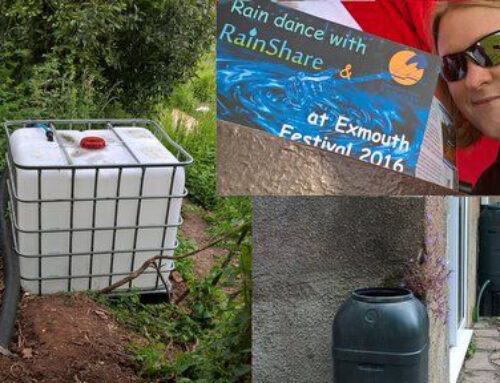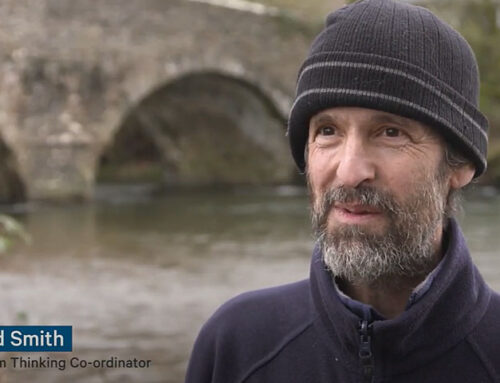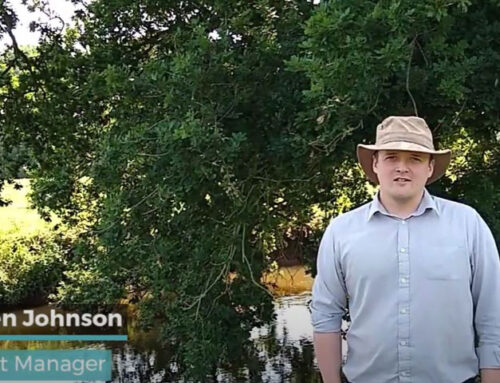

RESILIENCE BENEFITS
WATER

WILDLIFE

COMMUNITY

LEARNING

Sally Morgan and Kim Stoddart’s new book, The Climate Change Garden, is the complete gardener’s guide to coping withe the impacts of climate change. It’s a practical gardening book that shows you how to adapt and cope with the volatile weather extremes that lie ahead – storms, torrential rain, flooding and drought for example. There’s an in-depth look at how to adapt in the vegetable garden, what types of fruit to grow, how trees and wildlife can help in the battle against climate change and what changes may be necessary in the flower garden.
SALLY & KIM – THE CLIMATE CHANGE GARDEN
he scorching summer of 2018, with its Mediterranean-like high temperatures and many weeks of drought was a wake-up call for gardeners in the UK. The long predicted greater extremes of weather caused by climate change were well and truly upon us and our gardens suffered.
There’s no getting away from it; our climate and weather patterns are changing and fast. Our gardening practices need to catch up.
It’s no longer gardening as usual. Learning how to protect our gardens against the extremes of torrential rain, storms, heatwaves and drought and the goodness knows what else will be key. We need to learn which plants will be better suited to deal with such extremities in the first place and which techniques, practices and equipment can be put to use in our gardens, or future designs, to help provide a greater robustness over all.
That is where their book comes in – it is a brilliant guide to help gardeners meet the challenges that Climate Change is going to throw at them over the coming years – and it’s also very useful is you are doing the WATERTIGHT Challenge…!!
SALLY MORGAN
Sally is a botanist by training and when not helping on the farm or running courses, she writes articles and non-fiction books. She has written more than 300 books to-date, on a wealth of subjects, including natural history, science, and geography. She is editor of Organic Farming magazine published by the Soil Association and writes regularly for County Smallholder magazine. Her book, Living on an acre or less, was published by Green Books in 2016.
Sally is an avid gardener, growing her first plants at the tender age of 5, and was encouraged by both grandfathers who were keen vegetable growers. On moving to a 3-acre smallholding in Hampshire, her dream of keeping animals was realised and soon she had a menagerie of chickens, ducks, geese and a few sheep. A few years later, a visit to Rosemary Verey’s potager at Barnsley House led to development of a new kitchen garden. A lack of space (common on all smallholdings!) resulted in the move to Empire Farm.
Although the farm has 100 acres, Sally works on about 15 acres, leaving the rest to be grazed by a flock of sheep owned by a local farmer. Her main focus is her walled garden and a one-acre-plot with a polytunnel, vegetable growing areas, a perennial vegetable plot, a small orchard and fruit cage and several livestock pens. She loves to grow unusual plants, especially vegetables and experiments all the time with new techniques, always pushing the boundaries. She is interested in #sustainable #peatfree gardens. She blogs about her one acre plot here and on twitter (@Sally_Morgan) and Instagram (@sallymorgan_empirefarm and @climatechangegarden).
KIM STODDART
Kim has written about a more resilient form of gardening for some time now, covering a range of related topics for a variety of publications, including via her columns in Grow Your Own and Country Smallholding magazines.
Through her regular work for the Guardian, she has also gardened for free, made videos on seed saving, and generally communicated her passion, experiments and knowledge around all things organic, resilient and wildlife-friendly gardening. As editor of Garden Organic’s The Organic Way membership magazine, she also write the extreme gardener pages, explaining how to deal with climate change-related extremes of weather.
Kim’s background as a social entrepreneur, working with charities and companies with an ethical and environmental focus, has more recently come full-circle as she has opened up her gardens to the public via www.greenrocketcourses.com, running courses on polytunnel, and climate change grow-your-own, from which 20% of all profits go into her social enterprise, providing therapeutic gardening opportunities for a range of marginalised groups.
In the same ethical vein, 10% of net profits from the sale of her book will go to Garden Organic helping to give back in an even wider way through its publication.
My training gardens themselves are truly alive with wildlife as a result of the many attractive habitats I create within. They all have their place and help make the gardens such a productive, biodiverse, weather-hardier, but also very attractive and special place in which to be. Kim Stoddart





Leave A Comment